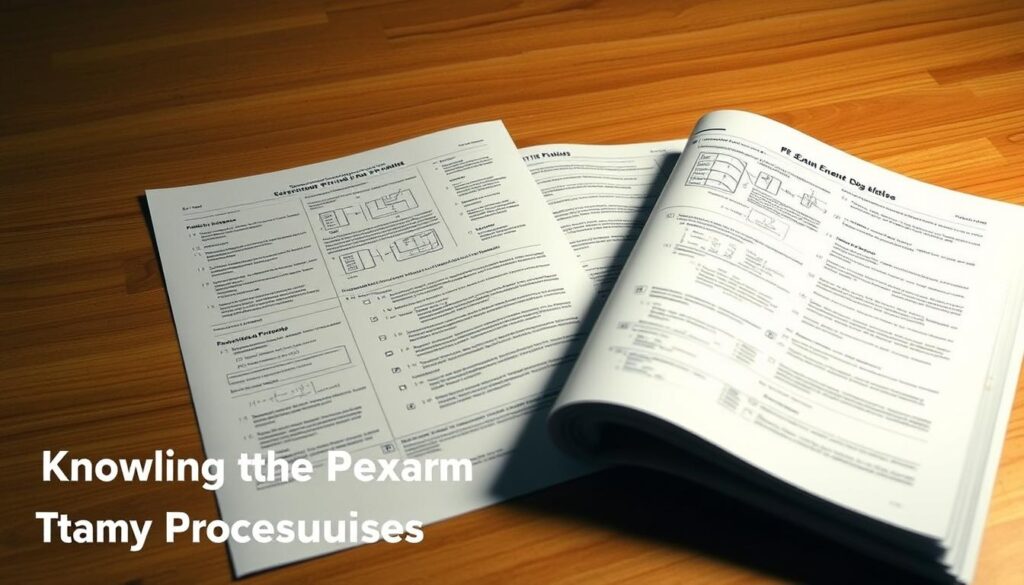Passing the PE Civil exam is a significant milestone in an engineer’s career, marking a crucial step towards professional licensure. With only a fraction of engineers achieving this feat, it’s essential to start preparing early. Effective civil engineering exam strategies can make all the difference in achieving success.
According to the requirements for a Civil Engineering PE license in the, a well-structured study plan is vital. By understanding the exam format and content, engineers can tailor their preparation to focus on key areas.
Key Takeaways
- Start preparing early for the PE Civil exam
- Develop a well-structured study plan
- Understand the exam format and content
- Utilize various study resources, such as review courses and practice exams
- Manage time effectively on exam day
Understanding the PE Civil Exam Structure
Understanding the structure of the PE Civil exam is crucial for effective preparation. The PE Civil exam is a comprehensive test designed to assess your competency in the field of civil engineering.
Exam Format and Duration
The PE Civil exam is an 80-question, nine-hour exam. It is a breadth and depth examination that tests your knowledge in various areas of civil engineering. The exam is divided into two main sections: breadth and depth. The breadth section covers general civil engineering topics, while the depth section allows you to demonstrate your expertise in a specific area.
Types of Questions
The exam consists of multiple-choice questions, with some questions being scenario-based. You will encounter questions that test your knowledge of civil engineering principles, as well as your ability to apply them in practical situations. The types of questions include:
- Multiple-choice questions with a single correct answer
- Scenario-based questions that require analysis and application of civil engineering principles
Scoring System
The PE Civil exam uses a scoring system that is designed to ensure fairness and accuracy. Your performance is evaluated based on your ability to demonstrate a minimum level of competency in the field of civil engineering. To pass the exam, you need to achieve a score that meets the requirements set by the licensing authority.
To maximize your chances of passing, it’s essential to familiarize yourself with the exam format, question types, and scoring system. By doing so, you’ll be better equipped to develop an effective study plan and prepare with confidence. For a comprehensive PE exam study guide, consider resources that provide detailed information on the exam structure and content.
Learning how to pass PE exam requires dedication and the right preparation strategy. By understanding the exam’s structure and content, you’ll be well on your way to achieving your goal of becoming a licensed professional engineer.
Creating a Study Plan

A well-structured study plan is the backbone of effective preparation for the PE Civil exam. It involves setting realistic goals, managing time effectively, and establishing daily study routines.
Setting Realistic Goals
Setting achievable goals is the first step towards a successful study plan. Identify your strengths and weaknesses, and allocate your study time accordingly. For instance, if you’re weaker in structural analysis, you may want to allocate more time to that area.
- Assess your current knowledge level
- Identify the topics that need more focus
- Set specific, measurable, achievable, relevant, and time-bound (SMART) goals
Time Management Techniques
Effective time management is crucial for covering all the necessary material before the exam. Consider using techniques like the Pomodoro Technique, which involves studying in focused 25-minute increments, followed by a 5-minute break.
“Time management is the key to unlocking your full potential. By prioritizing your tasks and managing your time effectively, you can achieve your goals.”
Utilizing PE exam time management strategies can significantly enhance your study efficiency.
Daily Study Routines
Consistency is key when it comes to studying for the PE Civil exam. Establishing a daily study routine helps in retaining information and making steady progress.
- Start with a review of what you studied the previous day
- Focus on a new topic each day, using relevant PE civil study materials
- Practice problems and past exams to reinforce your understanding
By combining realistic goals, effective time management, and consistent daily study routines, you can create a study plan that sets you up for success on the PE Civil exam.
Selecting the Right Study Materials
The key to successful PE Civil exam preparation lies in selecting the most effective study resources. With a plethora of study materials available, it’s crucial to identify the ones that best fit your learning needs.
Recommended Textbooks
Textbooks are a fundamental resource for PE Civil exam preparation. They provide in-depth coverage of the exam topics and are often recommended by professionals who have passed the exam. Some of the recommended textbooks include those published by the American Society of Civil Engineers (ASCE) and other renowned authors in the field of civil engineering.
When selecting textbooks, it’s essential to choose editions that are current and relevant to the exam format. Becoming familiar with these texts and marking important sections can significantly enhance your study efficiency.
Online Resources and Courses
In addition to textbooks, online resources and courses can provide structured learning and flexibility. Institutions like the School of PE offer comprehensive online courses tailored to the PE Civil exam. These courses often include video lectures, practice problems, and interactive quizzes to help reinforce your understanding of the material.
Websites like World Civil Society also offer free resources to learn civil engineering, which can be invaluable in your preparation journey.
Practice Exams and Question Banks
Practice exams and question banks are critical for assessing your knowledge and identifying areas for improvement. They simulate the actual exam experience, helping you become familiar with the exam format and time management.
Using practice exams and question banks from reputable sources can help you gauge your readiness and focus your study efforts on weak areas.
Utilizing Review Courses

A well-structured review course can be the key to your success on the PE Civil exam. Review courses provide a comprehensive and organized approach to studying, helping you stay on track and focused.
Benefits of a Structured Review
One of the primary advantages of a review course is its structured format. This helps you manage your study time more effectively and ensures that you cover all the necessary material. According to data, over 90% of participants who reported their results passed their exam after taking ASCE’s prep courses. This statistic highlights the effectiveness of a well-structured review.
“A good review course will not only teach you the material but also help you develop a study plan and test-taking strategies.”
Some key benefits of a structured review include:
- Comprehensive coverage of exam topics
- Improved time management
- Enhanced understanding of complex concepts
- Opportunities for practice with sample questions
Choosing the Right Course for You
With numerous review courses available, selecting the right one can be challenging. Here are some factors to consider:
| Course Feature | Description | Importance |
|---|---|---|
| Comprehensive Coverage | Covers all exam topics | High |
| Practice Questions | Includes sample questions and practice exams | High |
| Instructor Support | Offers guidance from experienced instructors | Medium |
| Flexibility | Allows for self-paced study | Medium |
When choosing a review course, consider your learning style, budget, and study goals. Look for courses that offer a money-back guarantee or free trial to ensure it meets your needs.
By utilizing a review course, you can significantly improve your chances of passing the PE Civil exam. Remember to stay focused, manage your time effectively, and practice consistently.
Practice Makes Perfect
Mastering the PE Civil exam requires more than just knowledge; it demands rigorous practice. Consistent practice not only reinforces your understanding of civil engineering concepts but also familiarizes you with the exam format and timing.
Importance of Mock Exams
Mock exams are a crucial component of your PE exam study guide. They simulate the actual test experience, helping you identify areas where you need improvement. By taking timed practice exams, you can assess your knowledge under pressure, just as you will during the actual exam.
For more practice problems and to get a feel for the exam format, you can refer to resources like Practicing Problems for PE, FE, and SE. This can help you gauge your readiness and pinpoint weak areas.
Analyzing Your Performance
After completing a mock exam, it’s essential to analyze your performance thoroughly. Review the questions you got wrong and understand why you made those mistakes. This process helps you learn from your errors and avoid repeating them in the actual exam.
Effective analysis involves not just identifying weak areas but also understanding the concepts behind the questions. This deepens your knowledge and improves your ability to apply concepts to different problems.
Time Management During Practice
Good PE exam time management strategies are vital for success. During your practice sessions, manage your time as you would during the actual exam. Allocate specific times for each question or section, and stick to it.
Practice under timed conditions helps you develop a sense of pacing, ensuring you can complete the exam within the allotted time. It’s also a good idea to review your time management strategy after each practice exam to make necessary adjustments.
By incorporating these practices into your study routine, you’ll be well-prepared to tackle the PE Civil exam with confidence. Remember, practice is not just about reinforcing knowledge; it’s also about building the skills and strategies needed to succeed under exam conditions.
Joining Study Groups

As you prepare for the PE Civil exam, consider the benefits of joining a study group to boost your study efforts. Collaborative learning can enhance your understanding and retention of complex civil engineering concepts, making it a valuable civil engineering exam strategy.
Finding the Right Study Group
To find a study group that suits your needs, start by searching online forums, social media groups, or professional networks like LinkedIn. You can also inquire about study groups through your local chapter of the American Society of Civil Engineers (ASCE) or other professional organizations. For more information on studying for the PE exam, you can visit this resource.
When selecting a study group, consider factors such as the group’s focus, the experience level of its members, and the frequency of meetings. It’s essential to find a group that aligns with your study goals and schedule.
Benefits of Collaborative Learning
Collaborative learning through study groups offers several benefits, including:
- Shared knowledge and resources
- Motivation and support from peers
- Opportunities to discuss and clarify complex topics
- Improved retention through active learning
By working together, you can gain a deeper understanding of the material and develop effective strategies for tackling the exam. For instance, you can create a table to summarize key topics and track your progress:
| Topic | Study Materials | Progress |
|---|---|---|
| Structural Analysis | Textbook, Online Course | 80% |
| Hydraulics | Practice Problems, Review Course | 70% |
| Geotechnical Engineering | Study Group Notes, Reference Manual | 90% |
By leveraging the collective knowledge and experience of your study group, you can enhance your preparation and boost your confidence as you approach the exam. Remember, effective civil engineering exam strategies often involve a combination of individual study and collaborative learning.
Focusing on Key Topics
Focusing on the right areas can significantly improve your chances of passing the PE Civil exam. The exam covers a broad range of topics in civil engineering, making it essential to identify and concentrate on the most critical subjects.
Civil Engineering Fundamentals
A strong foundation in civil engineering fundamentals is crucial. This includes understanding structural analysis, geotechnical engineering, transportation engineering, and water resources. Reviewing the basics and ensuring a solid grasp of these concepts will form the backbone of your study plan.
For comprehensive study materials, consider referring to the best resources for PE civil exam preparation.
Important Codes and Standards
Familiarity with important codes and standards is another vital aspect. The PE Civil exam often references specific codes such as the ASCE/SEI 7-16 Minimum Design Loads and Associated Criteria for Buildings and Other Structures and the AASHTO LRFD Bridge Design Specifications. Make sure to review the latest editions and understand how to apply these codes in problem-solving.
Specialty Areas to Focus On
Identify your specialty area and focus on it. Whether it’s structural, geotechnical, transportation, or water resources and hydraulics, delve deep into the specific topics relevant to your chosen field. Utilize PE civil study materials that are tailored to your specialty to maximize your study efficiency.
By concentrating on these key areas and utilizing the right study materials, you can enhance your preparation and boost your confidence for the exam.
Test-Taking Strategies

Effective test-taking strategies can make a significant difference in your PE Civil exam performance. By adopting the right approaches, you can enhance your ability to manage time, tackle complex problems, and stay focused under pressure.
Approaching Complex Problems
Complex problems on the PE Civil exam can be challenging, but there are strategies to simplify them. Start by carefully reading the problem statement and identifying the key elements required to solve it. Break down the problem into smaller, manageable parts, and tackle each part systematically.
For instance, when faced with a complex structural analysis problem, begin by determining the type of structure and the loads involved. Then, apply the relevant formulas and principles to calculate the required parameters. Practice solving similar problems during your preparation to build confidence and familiarity.
Managing Exam Stress
Managing stress during the exam is crucial for maintaining focus and performing well. Techniques such as deep breathing, positive self-talk, and taking short breaks can help alleviate anxiety. It’s also beneficial to arrive early at the exam venue and have a pre-exam routine to calm your nerves.
For more detailed tips on managing exam stress, you can refer to resources like test-taking strategies for the PE Civil, which offer valuable insights and practical advice.
Time Allocation Techniques
Effective time allocation is critical during the PE Civil exam. Allocate your time based on the number of questions and their complexity. Start with the questions you are most confident about, and then move on to the more challenging ones. Keep an eye on the clock and adjust your pace accordingly to ensure you complete all questions within the allotted time.
| Time Allocation Tips | Description |
|---|---|
| Read questions carefully | Understand what is being asked before attempting to solve |
| Start with easy questions | Boost your confidence by answering familiar questions first |
| Manage your time | Allocate time based on question complexity and difficulty |
By implementing these test-taking strategies, you can enhance your performance and increase your chances of success in the PE Civil exam.
Utilizing Technology
The PE Civil exam prep journey can be significantly enhanced by leveraging the right technology. With numerous digital tools available, candidates can streamline their study process, making it more efficient and effective.
Apps and Tools for Study
There are various apps and tools designed to aid in PE Civil exam preparation. These range from mobile applications that offer practice questions and quizzes to online platforms providing comprehensive study materials and PE civil exam prep courses.
Some popular tools include:
- Practice exam simulators
- Flashcard apps for memorization
- Study planners for organizing study schedules
Online Forums and Communities
Joining online forums and communities can be incredibly beneficial. These platforms allow candidates to connect with others who are also preparing for the exam, share resources, and get support. Websites like World Civil Society offer forums where individuals can discuss their experiences and exchange study tips.
Some benefits of participating in online forums include:
- Access to a wealth of shared knowledge and resources
- Opportunities to ask questions and get answers from experienced professionals
- Motivation and support from a community of peers
By effectively utilizing technology, including the best resources for the PE civil exam, candidates can enhance their preparation and improve their chances of success.
Knowing the Exam Day Procedures

Familiarizing yourself with the PE Civil exam day procedures is essential to ensure you’re well-prepared for the exam. Understanding the logistics of the exam day can significantly impact your performance.
What to Bring on Exam Day
It’s crucial to know what materials are allowed into the exam. According to the NCEES Examinee Guide, you should bring:
- Your exam admission ticket
- A valid form of identification
- Any other materials specified by the NCEES Examinee Guide
Arrival and Check-in Process
Arriving early is key. The NCEES Examinee Guide outlines the check-in process, which typically involves:
- Presenting your admission ticket and ID
- Completing any necessary paperwork
- Being seated at your designated exam station
Understanding Exam Rules
Understanding the exam rules is vital to avoid any issues during the exam. Some key rules to remember include:
- No electronic devices are allowed
- No communication with other examinees
- Following the instructions of the exam proctors
By knowing what to expect and following the rules, you can focus on showing off your knowledge and skills on the PE Civil exam.
Staying Motivated
Motivation is the driving force behind a successful PE Civil exam preparation journey. Staying motivated is crucial as it directly impacts your study effectiveness and overall performance.
Setting Milestones
One effective way to maintain motivation is by setting achievable milestones. Break down your study plan into smaller, manageable goals. For instance, you can set a goal to complete a certain number of practice problems or finish a specific chapter within a week.
- Create a detailed study schedule with specific targets.
- Track your progress regularly to stay on course.
- Adjust your milestones as needed based on your performance.
Rewarding Your Progress
Rewarding yourself for achieving your milestones can significantly boost your motivation. Choose rewards that are meaningful and enjoyable to you, such as taking a break to watch a movie, going out for a meal, or engaging in a hobby.
- Identify rewards that motivate you personally.
- Set clear criteria for when you will receive a reward.
- Celebrate your achievements, no matter how small they may seem.
For more tips for PE civil exam success, consider exploring structured study plans and resources available online. You can find valuable civil engineering exam strategies and study materials that can aid in your preparation.
Ensuring Physical and Mental Well-being

The journey to passing the PE Civil exam requires not just academic rigor but also a focus on your mental and physical health. As you prepare, it’s essential to strike a balance between studying and maintaining your overall well-being.
Importance of Breaks
Taking regular breaks during your study sessions can significantly enhance your productivity and retention. Breaks help prevent burnout, allowing you to return to your study materials with a fresh perspective. Incorporating activities you enjoy during these breaks can further boost your mental health.
Effective break strategies include:
- Taking a short walk outside
- Practicing deep breathing exercises
- Engaging in a hobby or activity you enjoy
Techniques for Reducing Anxiety
Managing anxiety is crucial for maintaining your mental well-being during PE Civil exam preparation. Techniques such as meditation, yoga, and progressive muscle relaxation can help alleviate stress. Establishing a consistent sleep schedule and maintaining a healthy diet also play critical roles in managing anxiety levels.
Consider the following anxiety-reduction techniques:
- Meditation and mindfulness practices
- Regular physical exercise
- Journaling your thoughts and feelings
By incorporating these strategies into your study routine, you can improve your overall well-being and enhance your ability to manage exam-related stress.
Reflecting on Your Preparation
After completing the PE Civil exam, reflecting on your preparation process can provide valuable insights into what worked well and what didn’t. This reflection is crucial in identifying areas for improvement, helping you refine your approach for future professional development.
Post-Exam Analysis
Conducting a post-exam analysis allows you to assess your study plan’s effectiveness, including the PE civil exam preparation tips and PE civil study materials you used. Identify the most helpful resources, such as textbooks, online courses, or practice exams, and consider how they contributed to your preparation.
Continuous Learning and Improvement
Continuous learning is essential for professional growth in civil engineering. The knowledge and skills you’ve acquired while preparing for the exam will serve as a foundation for your ongoing development. Stay updated with the latest developments in your field, and be open to new technologies and methodologies. By doing so, you’ll not only enhance your professional capabilities but also remain competitive in the job market.
